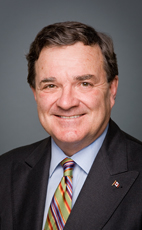Mr. Speaker, it is an important issue in terms of having fairness in the tax system. I am happy to review those issues.
 House of Commons photo
House of Commons photoWon his last election, in 2011, with 58% of the vote.
Taxation November 1st, 2006
Mr. Speaker, it is an important issue in terms of having fairness in the tax system. I am happy to review those issues.
Taxation November 1st, 2006
Mr. Speaker, certainly, we are interested in tax fairness as a fundamental principle and expanding the tax base. We believe, unlike the former government, that all Canadians, including corporations, should share in the tax burden fairly. That includes, legitimately I think, review of treaties with respect to taxation as well to ensure that all Canadians are accepting their fair share of the tax burden.
Income Trusts November 1st, 2006
Mr. Speaker, there was a substantial commitment to provide security for seniors in this country. Yesterday we made a very important announcement with respect to an issue that has been outstanding in this country for more than 40 years, and that is the question of income splitting for pensioners.
I know the Liberals opposite do not think it matters much for pensioners. However, if we look at a pensioner now receiving a pension of $40,000 for one spouse and the other spouse not receiving any pension, the tax savings will be $2,500 for that couple.
I know Liberals do not think that is much money but it is a lot of money for a lot of Canadian pensioners.
Income Trusts November 1st, 2006
Mr. Speaker, the RCMP is not investigating my Department of Finance but it is investigating the member's department of finance.
There were no leaks, no emails and no deals with friends on Bay Street. There was confidentiality, deliberation and the provision of certainty for capital markets in Canada.
Finally, there was an effort to create fairness for individual taxpayers and their families, while the member protects the big--
Income Trusts November 1st, 2006
Mr. Speaker, after 13 years in government and some time in opposition, as of October 18 this year, the member for Markham—Unionville said the following about his party's position on this important subject for all Canadians, “We don't have a definitive position on this”.
The former Liberal government offered confusion while we have provided clarity. It offered more confusion for independent families and their tax responsibilities. We offer balance in terms of corporations paying their fair share of taxes going forward in Canada.
Income Trusts November 1st, 2006
Mr. Speaker, the member opposite would never go over the top. I know--
Income Trusts November 1st, 2006
I did not say that. It was the member for Wascana in this House on September 27, 2005.
Income Trusts November 1st, 2006
Mr. Speaker, it has been said:
The fact of the matter is this is an important public policy question. It has to do with revenue to all governments, including the provinces. It has to do with fairness in the business system of this country, and it has to do with productivity and growth for the future. We would like to get the policy right for the long term....
Income Trusts November 1st, 2006
Mr. Speaker, in response to the member's comments, I am pleased to inform her that there is substantial provincial support for this initiative, including by the minister of finance of the province of Quebec with whom I spoke last evening.
This is an issue of national importance, not only with respect to the Government of Canada but also with respect to the provinces. It is a question of tax fairness. Should corporations pay their fair share of taxes in Canada or should we shift the balance more and more onto individual taxpayers?
It is an issue--
The Environment October 30th, 2006
Mr. Speaker, I know the premier of Ontario is grumpy about some things but the one thing he should not be grumpy about is the funding of the Canada-Ontario agreement which is fully funded in budget 2006. Not only that, but we recently signed an agreement on the collection of corporate taxes that will save businesses in Ontario $100 million a year.
Not only that, but the Canada-Ontario agreement, thanks to the Prime Minister, was extended for an additional year. It is now six years fully funded.